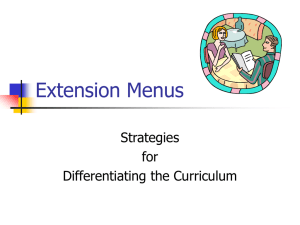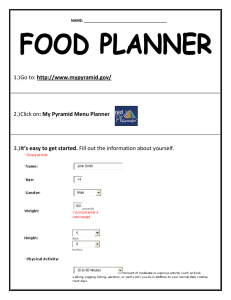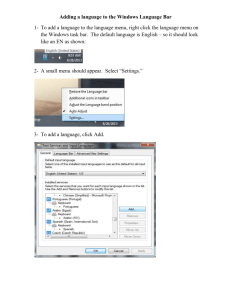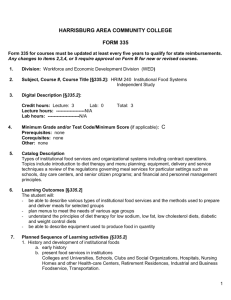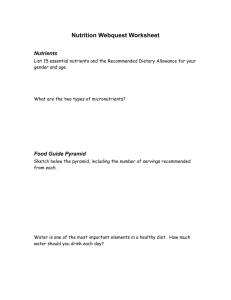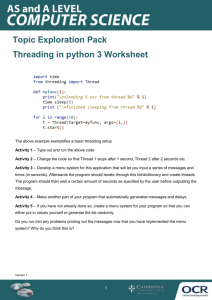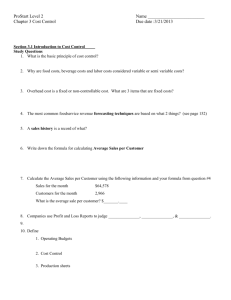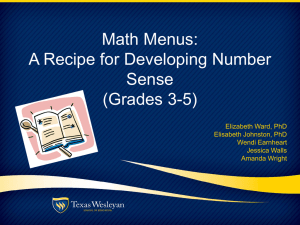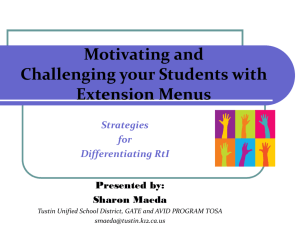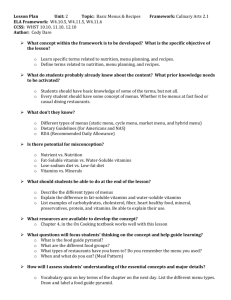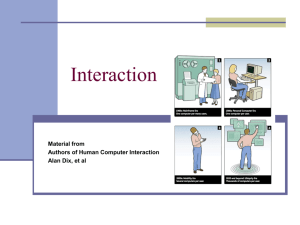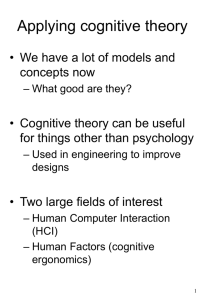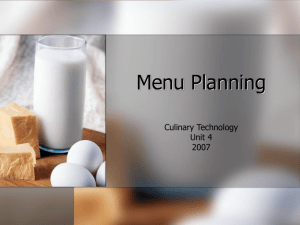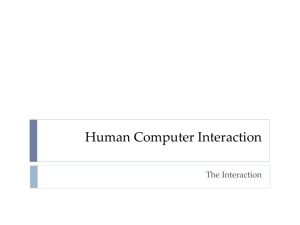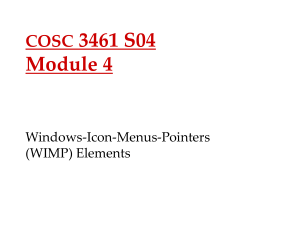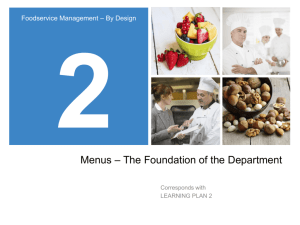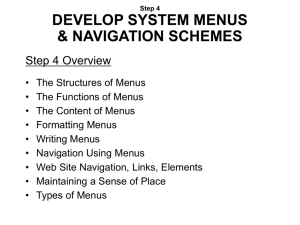course description
advertisement
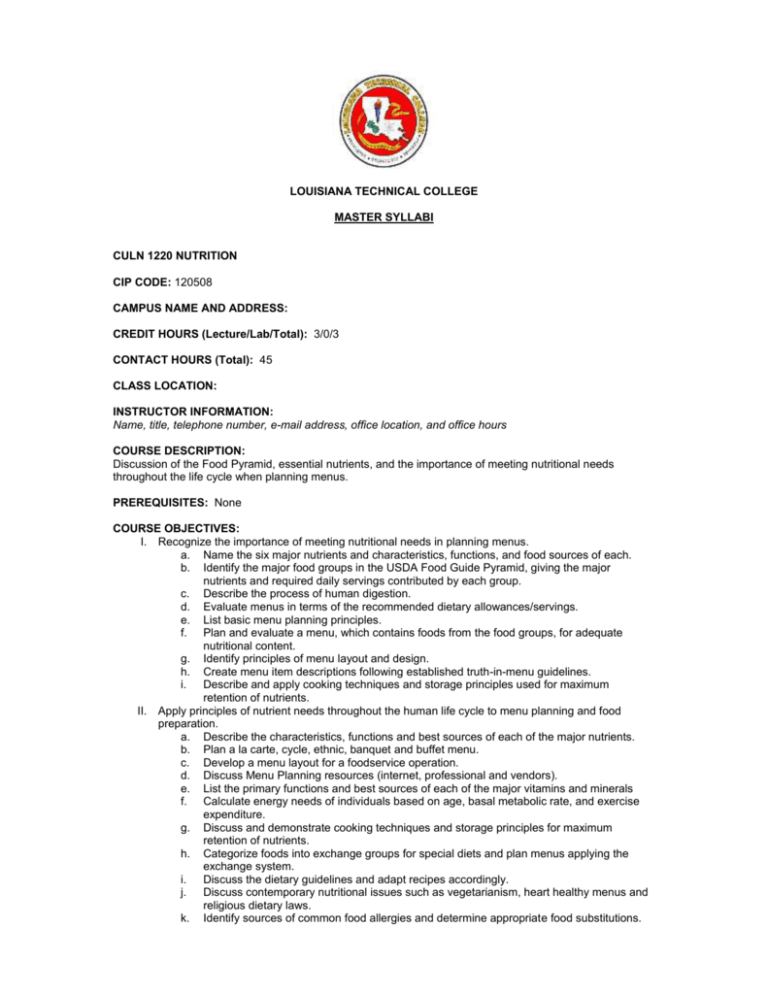
LOUISIANA TECHNICAL COLLEGE MASTER SYLLABI CULN 1220 NUTRITION CIP CODE: 120508 CAMPUS NAME AND ADDRESS: CREDIT HOURS (Lecture/Lab/Total): 3/0/3 CONTACT HOURS (Total): 45 CLASS LOCATION: INSTRUCTOR INFORMATION: Name, title, telephone number, e-mail address, office location, and office hours COURSE DESCRIPTION: Discussion of the Food Pyramid, essential nutrients, and the importance of meeting nutritional needs throughout the life cycle when planning menus. PREREQUISITES: None COURSE OBJECTIVES: I. Recognize the importance of meeting nutritional needs in planning menus. a. Name the six major nutrients and characteristics, functions, and food sources of each. b. Identify the major food groups in the USDA Food Guide Pyramid, giving the major nutrients and required daily servings contributed by each group. c. Describe the process of human digestion. d. Evaluate menus in terms of the recommended dietary allowances/servings. e. List basic menu planning principles. f. Plan and evaluate a menu, which contains foods from the food groups, for adequate nutritional content. g. Identify principles of menu layout and design. h. Create menu item descriptions following established truth-in-menu guidelines. i. Describe and apply cooking techniques and storage principles used for maximum retention of nutrients. II. Apply principles of nutrient needs throughout the human life cycle to menu planning and food preparation. a. Describe the characteristics, functions and best sources of each of the major nutrients. b. Plan a la carte, cycle, ethnic, banquet and buffet menu. c. Develop a menu layout for a foodservice operation. d. Discuss Menu Planning resources (internet, professional and vendors). e. List the primary functions and best sources of each of the major vitamins and minerals f. Calculate energy needs of individuals based on age, basal metabolic rate, and exercise expenditure. g. Discuss and demonstrate cooking techniques and storage principles for maximum retention of nutrients. h. Categorize foods into exchange groups for special diets and plan menus applying the exchange system. i. Discuss the dietary guidelines and adapt recipes accordingly. j. Discuss contemporary nutritional issues such as vegetarianism, heart healthy menus and religious dietary laws. k. Identify sources of common food allergies and determine appropriate food substitutions. TEXTBOOKS AND OTHER MATERIALS: Suggested texts: Nutrition for the Foodservice Professional; National Restaurant Association; Drummond Nutrition for Food Service and Culinary Professionals; John Wiley & Sons ATTENDANCE POLICY: Error! Not a valid link. EVALUATION AND GRADING: Be specific and clear. Include the types of evaluation activities you will use (tests, quizzes, papers, projects, homework, class participation, laboratory exercise, presentations, etc.) Also provide the weighted contributions of each evaluation activity toward the student’s final grade. ACADEMIC HONESTY: Plagiarism, cheating, and other forms of academic dishonesty are prohibited. In addition to other possible disciplinary sanctions, which may be imposed through the regular institutional procedures as a result of academic misconduct, your instructor will assign an “F” for the exercise or examination that evidences academic misconduct for the first offense and assign an “F” for the course for repeated offenses. STUDENTS WITH DISABILITIES: The Louisiana Technical College complies with Section 504 and the Americans with Disabilities Act. Students with disabilities who seek accommodations must make their requests known by contacting the Disabilities Coordinator at the beginning of each semester. If a disability is identified later in the semester, a non-retroactive accommodation plan will be developed. COURSE SCHEDULE: Should include homework assignments and due dates, test dates, topics, chapters that will be covered and when, due dates for projects, papers, and outside work, and date of the final exam.
